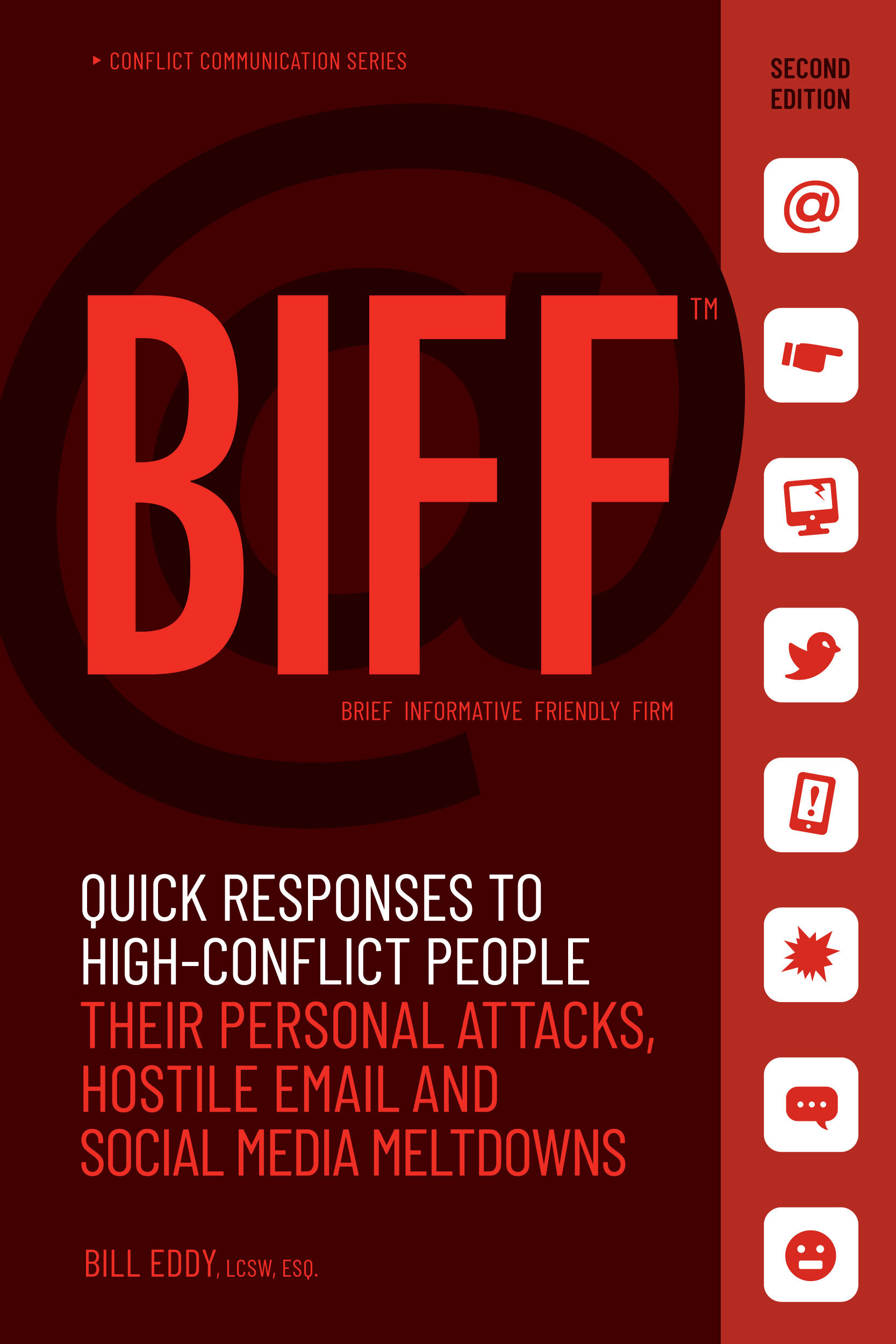Writing BIFF Responses to High Conflict People When You Don’t Feel Like It
©2019 Megan Hunter, MBA
Receiving an email, text or letter can put a dent in your day when it contains a zinger. It can get right under your skin and ruin your day and maybe even a few nights’ sleep as you perseverate about it and draft numerous responses in your head.
Then you write a response, re-write it, and finally send it. If the BIFF Response® method has been used, then it likely worked to calm the conflict or stop the emails/texts. If you didn’t respond in a BIFF® way, it likely resulted in continuing conflict rather than de-escalating or stopping the conflict altogether. And if you only half-BIFF’d it, then you probably got mixed results.
Discipline
Responding to HCPs requires discipline. Sometimes the HCP communication doesn’t get under your skin and is easy to respond to. It mostly depends on the relationship. If it’s a client taking jabs at you, writing a BIFF Response® may be an easy task. If it’s a colleague you’ve been dealing with for years, or an employee or boss who has a long history of hostility and blaming behavior along with other HCP behaviors like hiding information, gossiping about you, lording authority over you, then it’s not quite so easy to respond in the way you know you should.
Sometimes they finally push that final button and you feel the anger or annoyance reach new levels. Now it’s tricky. Now you may be hooked by their HCP emotion/defensive right brain making it nearly impossible to respond with BIFF. Why? Because you’re now in your emotion/defensive brain, so you’re going to be communicating emotion brain-to-emotion brain instead of logic brain-to-emotion brain, and when you do, you’ve just lost the ability to manage the communication and it is instead managing you!
EXAMPLE
Here is an example of an email sent by two co-managers to an employee. The employee was being let go after two years’ worth of repeated patterns of high conflict behavior.
INITIAL EMAIL
Dear Tyler – We’ve been working on next year’s strategic plan. We are planning to ramp up our marketing in order to see a minimum 10% growth over the next 12-18 months, which is going to take a lot of communication and planning to accomplish. We’ve realized that we need strong marketing expertise to reach these goals, which requires a new hire.
We are sorry to inform you that we need to find someone with a strong marketing background to fulfill your duties. You’ve been working with us for a long time, so this has not been easy decision for us but we have to do what is best for the company. We apologize for doing this via email but we chose it this way because we all work remotely and email has been our normal mode of communication.
We’d like to get this handled over the coming 30-60 days, which provides ample time to find a new position if that is what you’d like to do. We have compiled a list of everything that will need to be transferred over to us, which you will find attached. If you can think of anything that we might have overlooked, please let us know.
On your request, Beth and I will write a letter of recommendation and provide references whenever you need them.
This isn’t easy information to absorb, but please know your work has been highly valued and you’ve been an integral part of the team. All the best in your future endeavors.
Sincerely,
Jack and Beth
RESPONSE FROM TYLER
Hi Jack and Beth,
I'll think about your proposal. I'm not overly inclined to continue working with you another 30-60 days. I'll look at your list.
I may well decide not to work at all, but I'd appreciate a letter of recommendation from Jack. I doubt Beth’s would be sincere, so it's not necessary.
Thanks for your email, and the timing. It's the kind of thing I've come to expect of you, Beth.
Thank you,
Tyler
OPTION 1: RESPONSE FROM JACK AND BETH
Dear Tyler,
To clarify, our email was not a proposal. We will be wrapping this up in 30-60 days regardless of what you decide to do.
How can you expect either of us to want to write a letter of recommendation after making a comment like “I doubt Beth’s would be sincere”?
There’s no good timing for the end of a job. Sometimes the bandage just has to be ripped off, and whether you think we’re horrible people or not, we are in charge and have to make decisions in the best interest of the company.
Jack and Beth
OPTION 2: RESPONSE FROM JACK AND BETH
Dear Tyler,
Thanks for thinking about our proposal to work through the coming 30-60 days. Hopefully it will give you some time to find something new if you decide that’s what you’d like to do.
Thanks also for taking a look at the list. You’ve kept the files and records extremely organized, so it should be fairly easy to accomplish those items.
I will send a letter of recommendation this week, and please let us know if you decide you’d like one from Beth. She will be more than happy to write one.
All the best,
Jack and Beth
The Difference is Discipline
Jack and Beth felt like writing Option #1. This is the easiest way to respond because it only requires spewing out what’s brewing in your brain. It’s defensive. It’s only going to escalate the conflict. They didn’t feel like using the time and discipline required to write a BIFF Response®. After several years of Tyler’s undermining behavior, Beth and Jack snapped. But writing under the influence of snap is dangerous writing and the opposite of what’s required to de-escalate the conflict and avoid further back-and-forth emails.
Jack and Beth did not feel like writing Option #2, but they knew it was the right thing to do if they wanted to avoid the email merry-go-round, and to possibly avoid a potential lawsuit. You can bet that writing Option #1 felt great but it wouldn’t accomplish the goal. This requires discipline.
On interviewing Jack and Beth about their email options, they admitted that they had written and re-written Option #1 several times but chose the words they did because they wanted it to sting a little. That’s called being human – it’s a natural response when we get triggers by HCPs (and in some cases we may have a few HCP behaviors ourselves), but because they have a different operating system, we can’t reply from our emotion brain; instead, we must reply from our logic brain using BIFF. It works.
Keys for Writing BIFF Responses®
When You Don’t Feel Like It
Remind yourself that they were writing the email while in their emotional, defensive right brain, and that they did not have access to their logic left brain during the writing.
Remind yourself to respond from your logic left brain.
Write 3 different options.
Ask a friend or colleague to BIFF it for you, and ask them to be brutally honest.
Remind yourself that your BIFF Response is a:
Time management tool
Crisis management tool
Risk management tool
All the best writing BIFF!
Megan Hunter, MBA is co-founder and CEO of the High Conflict Institute in San Diego, California and publisher at Unhooked Media. She is co-author of Dating Radar with Bill Eddy, LCSW, Esq.; The High-Conflict Co-Parenting Survival Guide with Andrea LaRochelle, RFM; and author of Bait & Switch.








